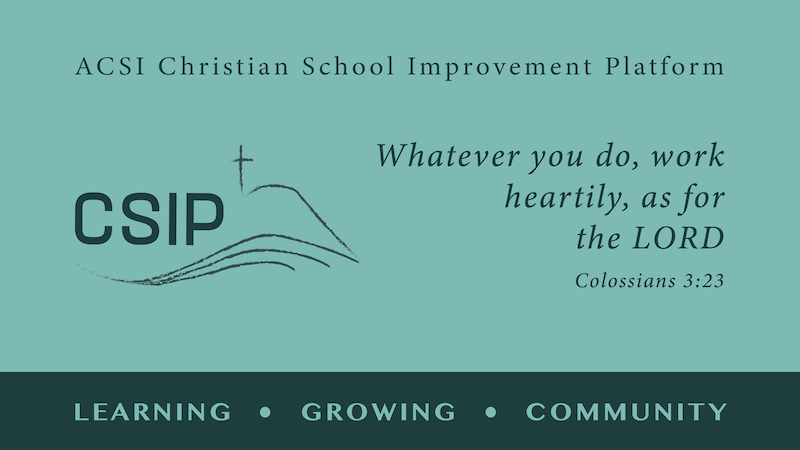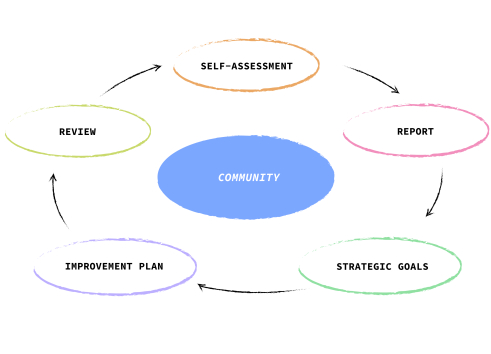Christian School Improvement Platform
Платформа улучшения христианских школ ACSI (CSIP) - это сообщество, в котором школы-члены ACSI могут участвовать в самооценке, определять стратегические цели и вносить свой вклад в стратегическое развитие в партнерстве с другими школами по мере того, как они реализуют христианское видение образования.

Стандарты CSIP предоставляют школам набор показателей для оценки их текущего видения христианского образования и его реализации на нескольких уровнях. Понимая, что каждая школа уникальна и находится в долгосрочном процессе роста и зрелости, эта самооценка помогает стратегически ставить цели для улучшения, используя термины, общие для школ ACSI по всему миру.
В этой статье вы познакомитесь с процессом и различными элементами платформы. Консультанты ACSI Europe готовы ответить на любые вопросы и оказать необходимую поддержку.
Эта платформа была представлена на IELC 2021. Все участники конференции IELC 2021 получают бесплатный доступ к этой платформе с 3 марта по 31 августа. Это этап тестирования, на котором мы запросим ваши отзывы до официального запуска CSIP 1 сентября 2021 года. После 1 сентября 2021 года платформа будет доступна школам-участникам при продлении годового членства в школе. Доступно более подробное руководство пользователя (на английском языке).
Мы разработаем русский перевод этой платформы, когда увидим растущий интерес со стороны этого сообщества.
The CSIP Standards
Each member of your self-assessment team should represent various members of the school community. Ideally, this would include a school board member, a school leader and a lead teacher with input from other individuals or groups.
The self-assessment is divided into five standards. Each of the standards describes a domain or area of focus for school improvement, and the rationale for including it in the self-assessment process for a Christian school.
Standard 1: Philosophy and Foundations
Standard 2: Leadership and Personnel
Standard 3: Teaching and Learning
Standard 4: Spiritual Formation
Standard 5: Strategic School Improvement Plan
Each standard has 4-6 indicators that identify an aspect of quality for a Christian school related to the standard. The self-assessment involves the school reporting its level of development on each indicator. Each indicator has a related set of four descriptors, presented in a rubric, which the school uses to determine the extent to which its operations are consistent with the indicator.
For each indicator, the self-assessment team reports their school’s level of development as:
- Forming: the school recognizes its need to take significant steps in this area.
- Developing: the school has taken steps towards quality practice but identifies a significant need for growth in this area.
- Maturing: the school has established quality practice in this area and is ready to share their experience with others.
- Flourishing: the school has gone beyond the level of quality expressed in the indicator and is contributing to the growth of other schools by sharing their experience and expertise in this area.
The Process
Identify your team members beginning with 1 of the current users named in your school membership form. User accounts must be set up on the main website with the school code.
Each of the 5 standards are described here in an overview statement with buttons to view and respond to each indicator within that standard.
After submitting your self-assessment, a report will be generated with recommendations for your consideration. This report will provide a basis for your collaboration with ACSI and our network of schools as we work together to address your needs and provide opportunities to share your strengths with others for mutual growth.
Strategic Goals
Strategic Goals are essential for school improvement. By using your completed Self-assessment and latest Report, you can help your leadership team focus on key areas of needed growth.
After you examine this report, we recommend that you invite a few members of your school community and selected leaders from other schools to view this report and comment on potential strategies for development. This will set a context for your strategic goals and help your leadership team choose the resources and professional development tools to best address those goals.
Strategic School Improvement Plan
Based on your strategic goals, select the professional services available from ACSI and our partners which best help your school meet those goals. You may also add and edit the services which you host or in which you participate.
Use the platform to record the activities you have undertaken and the progress you have made each year as you work towards your strategic goals. Monitor, share and celebrate your progress towards your strategic goals as you implement your plan. Review your goals and make adjustments to your plan as needed.
Peer-review
The highest level of school engagement is the peer-review process, which provides accountability through relationships.
You may request a peer-review from a team of school leaders who have completed ACSI approved training for this process. This team will provide verification of your self-assessment and recommend special recognition for your school. This review can be completed in a 1-day visit or in combination with another event or activity hosted by your school.


